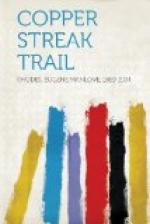History does not remark upon this little transaction, however. In some piecemeal fashion, a sentence here, a phrase elsewhere, with scores or hundreds of pages intervening, History does, indeed, make yawning allusion to some such trivial circumstance; refraining from comment in the most well-bred manner imaginable. It is only the ill-affected, the malcontents, who dwell upon such details. Is this not, indeed, a most beautiful world, and ours the land of opportunity, progress, education? Let our faces, then, be ever glad and shining. Let us tune ourselves with the Infinite; let a golden thread run through all our days; no frowns, no grouches, no scolding—no, no! No ingratitude for all the bounties of Providence. Let us, then, be up and doing.—Doing, certainly; but why not think a little too?
Why is thinking in such disfavor? Why is thinking, about subjects and things, the one crime never forgiven by respectability? We have given away our resources, what should have been our common wealth; we have squandered our land, wasted our forests. “Such trifles are not my business,” interrupts History, rather feverish of manner; “my duty to record and magnify the affairs of the great.”—Allow me, madam; we have given away our coal, the wealth of the past; our oil, the wealth of to-day; except we do presently think to some purpose, we shall give away our stored electricity, the wealth of the future—our water power which should, which must, remain ours and our children’s. “Socialist!” shrieks History.
The youth of Abingdon speak glibly of Shepherd Kings, Constitution of Lycurgus, Thermopylae, Consul Duilius, or the Licinian Laws; the more advanced are even as far down as Elizabeth. For the rich and unmatched history of their own land, they have but a shallow patter of that; no guess at its high meaning, no hint of a possible destiny apart from glory and greed and war, a future and opportunity “too high for hate, too great for rivalry.” The history of America is the story of the pioneer and the story of the immigrant. The students are taught nothing of the one or the other—except for the case of certain immigrant pioneers, enskied and sainted, who never left the hearing of the sea; a sturdy and stout-hearted folk enough, but something press-agented.
Outside of school the student hears no mention of living immigrant or pioneer save in terms of gibe and sneer and taunt. The color and high romance of his own township is a thing undreamed of, as vague and shapeless as the foundations of Enoch, the city of Cain. And for his own farmstead, though for the first time on earth a man made here a home; though valor blazed the path; though he laid the foundation of that house in hope and in love set up the gates of it, none knows the name of that man or of his bolder mate. There are no traditions—and no ballads.
A seven-mile stretch of the river follows the outlines of a sickle, or, if you are not familiar with sickles, of a handmade figure five. Abingdon lies at the sickle point, prosperous Vesper at the end of the handle; Vesper, the county seat, abode of lawyers and doctors—some bankers, too. Home also of retired business men, of retired farmers; home of old families, hereditary county officials, legislators.




